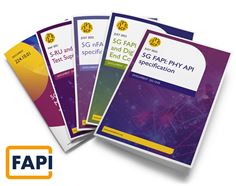[ad_1]
SCF’s 5G FAPI suite specifications continue to evolve to meet industry needs and 3GPP alignment
London, UK, 27 July 2022 – Small Cell Forum (SCF) today announced the release of three updated specifications within the 5G FAPI suite – 5G FAPI PHY API, 5G FAPI: P19 RF and Digital Frontend Control API, and 5G nFAPI.

SCF 5G FAPI suite
The specifications are used in millions of the world’s system-on-a-chip (SoC) small cells. FAPI sits at the crucial confluence of L1 hardware and L2 application and can be utilized in a variety of disaggregated RAN architectures (ranging from fully integrated to split-2/6/7.2x).
nFAPI is an interface for supporting a virtualized MAC/PHY split and is pivotal in ensuring interoperability for virtual small cell networks, enabling multivendor C-RAN economics today as well as a smooth evolution path to 5G.
The continual development of the FAPI specifications by SCF, with commitment to regular release updates, ensures the maturity, performance and relevance of the APIs, as well as their alignment with other major industry standards.
New and updated features in SCF222 5G FAPI PHY API:
New features:
- New radio (NR) positioning (Rel-16)
- 7.2x FH status awareness
Updated features:
- Delay Management: added timestamp-free option
- Shared-memory: streamlined throughout the specification; support for 64-bit pointers
- Robust error handling: extended status report, P5 timeouts
- Mixed numerology: updated to account for new features since FAPIv2, clarity and performance.
New and updated features in 5G nFAPI:
- Continuing alignment with evolution of FAPI specifications
- Optimizations in nFAPI headers and messages
- Recommendations for non-ideal fronthaul as nFAPI transport
SCF member companies involved in the development of the upgraded specifications this year were: Qualcomm, Radisys, Picocom, Reliance Jio, BT and Analog Devices.
Andrei Radulescu, FAPI Rapporteur and Senior Staff Engineer, Qualcomm Technologies, Inc. said: “Small Cell Forum is a key enabler for RAN disaggregation. Multiple splits associated with virtualized open network architectures are made possible by the Forum’s continuing evolution of the FAPI interface, which provides the essential link between the software functions of the MAC and hardware functions of the physical layer.
“FAPI facilitates the further modularization of the network while at the same time enabling the flexibility and economies that come with an open ecosystem. This is why the ongoing maintenance and development of these specifications is so important, as well as their continuing alignment with the 3GPP roadmap and O-RAN interfaces.”
The complete SCF FAPI specifications suite comprises:
[Ends]
For more information contact Claire Marshall: [email protected] / +44 (0)7771652363.
About SCF
Small Cell Forum develops the technical and commercial enablers to accelerate small cell adoption and drive wide-scale densification.
Broad roll-out of small cells will make high-grade mobile connectivity accessible and affordable for industries, enterprises and for rural and urban communities. That, in turn, will drive new business opportunities for a widening ecosystem of service providers.
Those service providers are central to our work program. Our operator members establish the requirements that drive the activities and outputs of our technical groups.
We have driven the standardization of key elements of small cell technology including Iuh, FAPI, nFAPI, SON, services APIs, TR-069 evolution and the enhancement of the X2 interface. These specifications enable an open, multi-vendor platform and lower barriers to densification for all stakeholders.
Today our members are driving solutions that include:
- 5G Components, Products, Networks
- Dis-aggregated 5G Small Cells
- 5G regulation & safety
- Neutral Host requirements
- Private network blueprints
- CV2X
- Open6 and Fronthaul
The Small Cell Forum Release Program has now established business cases and market drivers for all the main use cases, clarifying market needs and addressing barriers to deployment for residential, enterprise, rural & remote, and urban small cells. It has also established initiatives relating to both public and private (MNO) coordination.
[ad_2]
Source link

